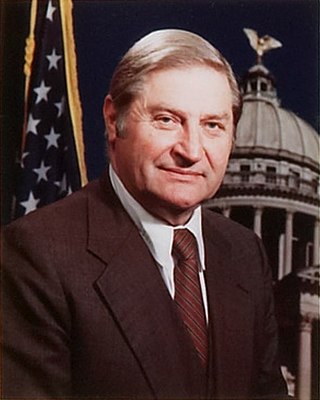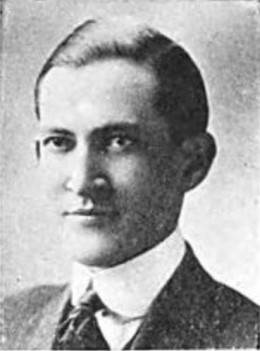
Byron Patton "Pat" Harrison was a Mississippi politician who served as a Democrat in the United States House of Representatives from 1911 to 1919 and in the United States Senate from 1919 until his death.

The Mississippi State Senate is the upper house of the Mississippi Legislature,the state legislature of the U.S. state of Mississippi. The Senate,along with the lower Mississippi House of Representatives,convenes at the Mississippi State Capitol in Jackson. The Lieutenant Governor of Mississippi serves as President of the Senate.

The Vermont Senate is the upper house of the Vermont General Assembly,the state legislature of the U.S. state of Vermont. The senate consists of 30 members elected from multi-member districts. Each senator represents at least 20,300 citizens. Senators are elected to two-year terms and there is no limit to the number of terms that a senator may serve.

The Oklahoma Senate is the upper house of the two houses of the Legislature of Oklahoma,the other being the Oklahoma House of Representatives. The total number of senators is set at 48 by the Oklahoma Constitution.

The president pro tempore of the North Carolina Senate is the highest-ranking officer of one house of the North Carolina General Assembly. The president of the Senate is the Lieutenant Governor of North Carolina,but the president pro tempore actually holds most of the power and presides in the absence of the Lt. Governor. The president pro tempore,a senior member of the party with a majority of seats,appoints senators to committees and also appoints certain members of state boards and commissions. From 1777 to 1868,North Carolina had no Lieutenant Governor,and the highest-ranking officer of the Senate was known as the "Speaker". The Speaker of the Senate was next in line if the office of Governor became vacant. This occurred on two occasions.

The president pro tempore of the Oklahoma Senate is the second-highest-ranking official of the Oklahoma Senate and the highest-ranking state senator. The Oklahoma Constitution designates the Lieutenant Governor of Oklahoma as the highest-ranking official,serving ex officio as President of the Senate,even though the lieutenant governor only votes in the case of a tie. During the lieutenant governor's absence,the president pro tempore presides over sessions. By longstanding custom,the lieutenant governor presides over sessions devoted to ceremonial purposes,while the bulk of the legislative management and political power is reserved for the president pro tempore,who is elected directly by the Oklahoma Senate.

The Louisiana State Senate is the Upper House of the State Legislature of Louisiana. All senators serve four-year terms and are assigned to multiple committees.
The One Hundred Fifteenth Ohio General Assembly was the legislative body of the state of Ohio in 1983 and 1984. In this General Assembly,both the Ohio Senate and the Ohio House of Representatives were controlled by the Democratic Party. In the Senate,there were 17 Democrats and 16 Republicans. In the House,there were 62 Democrats and 37 Republicans. It was the first General Assembly to use redistricted legislative districts from the 1980 United States Census.

The Eighth Oklahoma Legislature was a meeting of the legislative branch of the government of Oklahoma,composed of the Oklahoma Senate and the Oklahoma House of Representatives. The state legislature met in Oklahoma City,in regular session from January 4 to April 2,1921,and in special session from April 25 to May 21,1921,during the third year of the term of Governor James B.A. Robertson. It was the first time,Republicans took control of the Oklahoma House of Representatives. In 1920,Bessie McColgin,a Republican,became the first woman elected to the Oklahoma House of Representatives. Lamar Looney,Oklahoma's first female state senator and a Democrat,was also elected in 1920.

Thomas Arlin Gollott is a businessman and former state legislator in Mississippi. A Democrat,he served as a member of the Mississippi House of Representatives and Mississippi Senate before becoming a Republican in 2007. He represented the 50th District from 1980 to 2020. He had served continuously in the Mississippi Legislature from 1968,when he sat as a state representative,which he served until his election as state senator in 1979. He had been a Democrat until 2007,when he switched his affiliation to Republican. In September 2017,he became the longest-serving member of the Mississippi Legislature in history. He retired from the Senate in 2020,after deciding not to run for another term.

Glen Sennett Deweese was an American convenience store owner and Democratic politician. He was a member of the Mississippi State Senate from 1976 to 1992,and its president pro tempore from 1986 to 1992.

Thomas Norman Brooks was an American farmer and Democratic politician. He was a member of the Mississippi Legislature almost continuously from 1952 to 1985,when he was convicted and jailed for influence peddling. He also was the president pro tempore of the Mississippi State Senate from 1984 to his incarceration.

Charles M. Deaton was an American politician from Leflore County,Mississippi. He was a member of the Mississippi House of Representatives from 1960 to 1980,and a gubernatorial candidate in 1980.
George Malone Yarbrough was a politician in Mississippi who served in the Mississippi House of Representatives between 1952–1956 and in the Mississippi State Senate between 1956–1968 and 1972–1980. He was a member of the Democratic Party.

Earl Evans Jr. was an American Democratic politician and public official in Mississippi. He served in the Mississippi Senate including as President Pro Tempore.

Winfred Cooper "Chubby" Adams was an American politician in Mississippi. He served in the Mississippi House of Representatives from 1924 to 1926 and in the Mississippi State Senate from 1928 to 1936. He served as the Senate's President Pro Tempore from 1932 to 1936

William Brooks Alexander Sr. was an American politician. He represented Bolivar County in the Mississippi State Senate from 1952 to his death in 1960.

Frederick Brougher Smith was an American politician. He served in both houses of the Mississippi Legislature,and was the President pro tempore of the Mississippi State Senate in 1922.

Cecil Lamar Simmons is an American politician,lawyer,and entomologist. He served in the Mississippi House of Representatives from 1972 to 1998 and was its first Speaker Pro tempore,serving from 1987 to 1992. Simmons became a leader in House reform and in 1987 led a coalition of House members to curtail the Speaker's powers,creating the position of Speaker pro tempore in the process. He then led opposition to the increasing power of the new speaker Tim Ford.


















